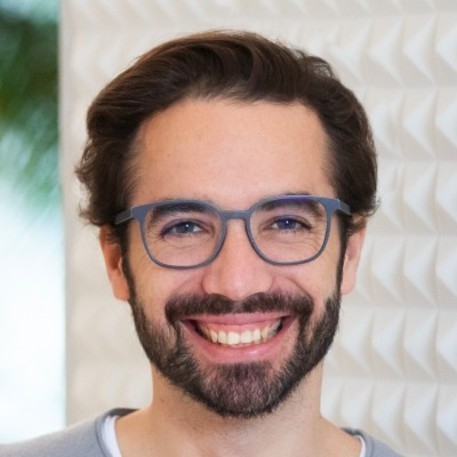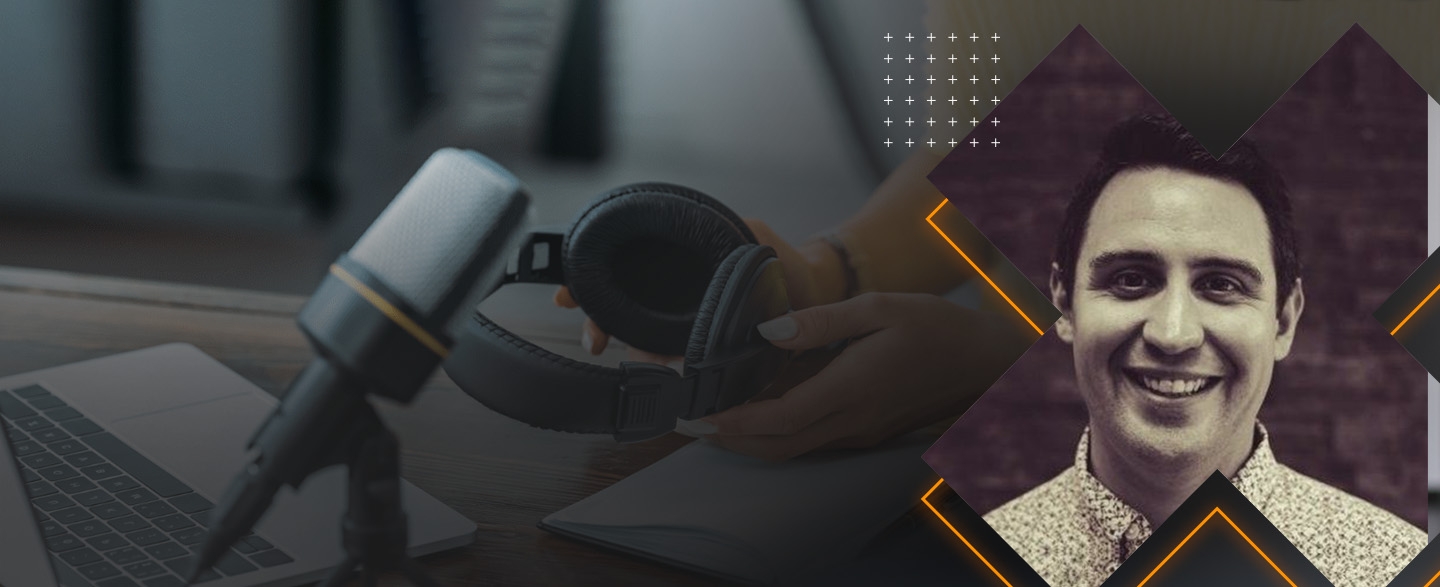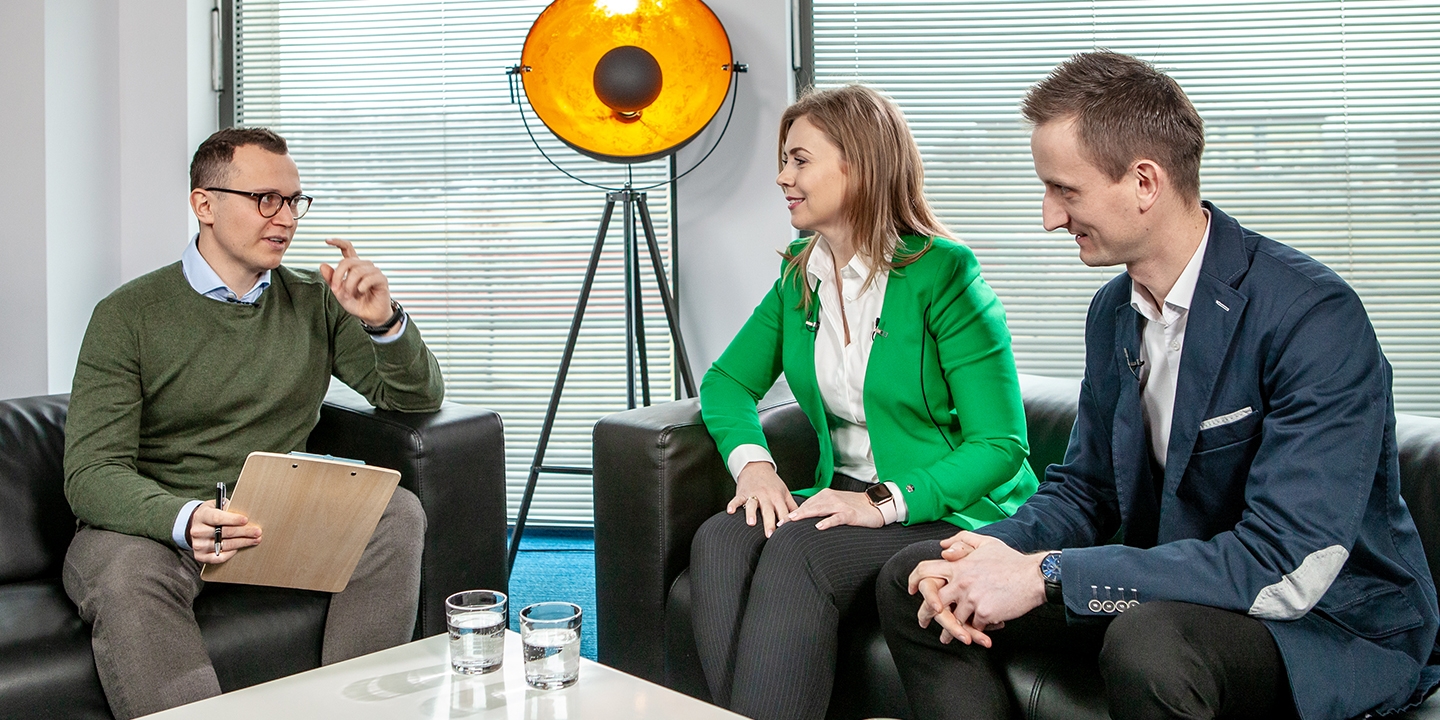- Insights hub
- /
- What it takes to be a dig...

What it takes to be a digital optimist? with Geronimo-Noah Hirschal
- DetailsAbout the talks
- TranscriptTranscript
What it takes to be a digital optimist? with Geronimo-Noah Hirschal
Michał Grela
Relationship Manager at Future Processing
Geronimo calls himself a Digital Optimist. We discuss why it’s important to make the most of the positive aspect the technology brings to the table, and what’s so positive he sees in tech.
Many people are reluctant or hesitant when it comes to embracing technology. No wonder, as in a constantly changing world, it is easy to dismiss or shrug off the never ending stream of new things that are thrown our way.
On the other hand, there are people like, Geronimo, who calls himself a Digital Optimist. For Geronimo, it’s important to make the most of the positive aspect the technology brings to the table, and he spreads this word across the local community. In this episode I ask him what’s so positive he sees in tech, and why he thinks we all should be digital optimists.
Michał Grela (MG): Hi, my name is Michael. Welcome to yet another episode of IT Insights by Future Processing. Today, we’re going to focus on what it takes to be a digital optimist. Many people are reluctant or hesitant when it comes to embracing technology and no wonder in a world of constantly changing technologies, it is just easy to dismiss or shrug off the never ending stream of new things that are thrown our way. Many also worry that excessive use and badly designed technologies can have a tremendous damaging effect on children lives, for example, as they become destructible, impulsive, etc. more self obsessed in general.
On the other hand, there are people like my guest today, Geronimo, who calls himself a digital optimist and for Geronimo, it’s important to make the most of the positive aspect of what the technology brings to the table and he spreads the word across the local community.
Today, I’ll be super excited to ask him what’s so positive he sees in tech and why he thinks we all should be digital optimists? I’m happy to have you here, Geronimo, thanks for joining me.
Geronimo-Noah Hirschal (GNH): Hi Michael, so glad to be here. Thank you very much.
MG: I’m really looking forward to this conversation, but before we dig deeper, could you please introduce yourself, say a few words about your experience and the idea behind Digital Optimist?
GNH: Yes, of course. Thank you to give me the opportunity to tell more about the idea of Digital Optimist and what are companies doing as well. Digital optimism, as an idea, came up for me two years ago when I realized that a lot of customers are reluctant to technology, exactly as you said before.
And this reluctancy is based on the lack of digital literacy, in fact. So it became a big issue for me to bring together people and think about technology, have a good understanding about actual technologies that are available and how we can use them in a meaningful way – business wise, but also as persons. What we are doing at the Digital Optimist company here in Austria is we are working with artificial intelligence and help clients to find the best strategy to AI and implement it. That’s basically it in a nutshell.
MG: Okay, thanks for that intro. When I was preparing to this conversation, I found that you called yourself a digital coach or digital optimist. It’s something like a coach or a strategist or an advisor, so my first question would be, why would a tech executive need the services of a digital coach in the first place? Why is that necessary or valuable?
GHN: I think it’s very helpful to have people around to have a conversation about the new technologies, how they’re used, what could be of use, but also to have the bigger picture, how the industry is moving, also what does it mean to implement new digital strategies. So it’s a holistic approach that we are taking, and we are looking for the actual problem that an organization or a customer has and how to approach it properly with digital tools and means, because we are absolutely convinced that the digitization and digital transformation brings us to the next level of economic, but also socioeconomic society.
MG: Definitely, I think that it has more than just a business impact. It’s a social thing, and we should perceive it twofold, not only business wise, but also human wise and that’s also an important aspect. But before we cover that bit, you’ve briefly touched on a digital strategy and helping organizations going through this digital strategy aspects. Being an organization, how do you make the most of it once you have it?
GHN: Making the most out of a digital strategy – first of all, you have to think long-term, but break down the project initiative in small little steps. This helps you to not lose your path on the way of a digitization project, because you can evolve in any direction essentially. There are so many possibilities for verticals for spin-offs for another project or product you can spin off your digitization strategy, so it really makes sense to have this, GrowthHackers says, a North Star Metric, a vision, where do we want to go, what should our impact in the industry be. And then slice the problem into little pieces and start with a small one that is easy to achieve. And from there on, iteratively, continue your path.
This totally makes sense and especially when you’re talking deep tech, artificial intelligence or blockchain technologies, they really have the power to transform a business on the longterm, but it makes no sense, in my opinion or experience, to take the big leap first, because as you said before, it’s also a transformational process in how we work together. Tools have to be learned. People have to get common with the new vision or with the goals. So doing this step by step, but doing it, is the right way in our perspective. So the strategy is very, very, very, very essential.
MG: Nicely said. All right, let’s focus on the optimist side. Why do you think being a digital optimist is beneficial? Why should we be open-minded, embrace new technologies, etc., why is that okay?
GHN: First of all, I think being optimistic is a philosophical choice. It really feels better to believe in a world that is evolving into a good direction. I think we have a lot of pessimistic news coverage, we have a lot of drama all over the internet, we have a lot of information that don’t really give us a clear sight on the shape the world really is. There is a very nice book. I don’t know if you know that, it’s called Factfulness of Hans Rosling. He’s a Swedish scientist, he sadly died some years ago, but in this book he elaborates statistically, so a scientific elaboration of how the world got better in the last decades. And on the other side, how worse the look or the bias when looking at the world is, especially in Western and well educated bubbles, which is crazy.
We believe, or we can actually really tend to believe, that everything is getting worse and worse and worse, but it isn’t, the facts are talking a completely different language. So, I think it’s, first of all, good to be optimistic, because you feel better and you can also have a bigger impact, because it really attracts other people that are the same and that are active and they want to do and get things done and change things to the better. And on the other side, we don’t have any reason to be pessimistic. Of course we have challenges, great challenges, talk about climate, talk about the gap between poor and rich or a monopolization by big tech companies, but these are things we have to tackle. And if you are not convinced that you can move the world to the better, then you won’t even start with it and this is the worst choice I think.
MG: Yeah, definitely. I too believe that attitude is a very important thing. And also, again, not only in business, but in life and that a good attitude is almost 50% of success and that being optimistic on a daily basis really helps, not only you, but also people around you, definitely.
GHN: You can also, excuse me if I just step in once more, you can also break this down to a business level. Every business is facing challenges right now, because of digital transformation and moving markets and the situation with COVID-19 and the accelerated transformation of the world. This is, in fact, the main point, I think, everything is getting very fast because of digital technologies. And the good news about it is that these technologies really get democratised day by day.
Accessibility of high performance technology that helps you to accomplish your goals and the next steps and to evolve as a company, they are here. So this is also something where we can really be optimistic about. So nothing is lost in fact, and it’s never too late to start. And for companies that are ahead of this journey, that started their digitisation initiatives 10, 20 years ago, they really see that there is always something new to learn and this is something we can really be optimistic about. And I think that we can, and we will overcome all those challenges in the next 5 to 10 years. I’m absolutely optimistic about this.
MG: There’s no other way. I completely agree with you, we’re on the same page here. I believe that technology is neither good or bad, it’s the way it’s used and we can and should use it for good and the whole movement of Tech for Good and people like yourself evangelising the market, saying that we should embrace technology, we should use it to leverage it, to create not only competitive advantage, but also to make the world a better place – that’s the trend to follow. That’s definitely a trend to follow. And I’m super happy to see that sort of initiatives being present and increasing the volume of the positivism on the market in general. But there’s also another heart of Geronimo, meaning community builder. I know for a fact that you’ve built a nice community around blockchain and wine, that’s a particular combination. Could you tell us a few words around that? Why did you choose blockchain as a theme for the community?
GHN: It’s a very nice story. We formed a community around a project and for me it was a proof of concept: can we make a very abstract and very technical topic like blockchain technology, which was a hype back in 2017 when we started, of course, how can we make this very accessible and create a community with low entry barrier? The idea was to do a living campaign for a blockchain event. I was approached by two young guys, they wanted to have a big blockchain summit here in Austria in Vienna. There was no brand exposure, they were totally new and of course, like every young project, a certain lack of capital.
So the idea was not to create a campaign or to do classic marketing or to invest heavily in media coverage or create content out of the blue, but to create a community, a living and honestly built community, from there on all this positive effects of communication, of customer base, of early adopters of word of mouth, come out automatically. I think marketing and campaigning has to totally evolve around this idea. It’s not about talking, but it’s about doing and the talking comes later. And this was the whole thing we wanted to start a little buzz, so we started to have this community meetups, it was very hands on, just a space with some chairs and the possibility to get together talking about the topic of blockchain and Bitcoin and all this stuff.
We started doing this, we started doing it every Wednesday. We just stopped, because of the COVID situation, because we cannot get together in small spaces anymore, but we built a community of about 500 people online, connected on Telegram, with a constant flow of 20 to 60 people each and every week with gender not parity, but we had around 25 to 20% of female attendees every week, which is awesome for a deep tech community and it really helped the community to grow and to stay nice. And the community building and management part is just around this. It was not about telling the community what they should talk about or what is essential in the blockchain space or whatever, you give them the freedom to talk about what they care about and just give them the frame, which is the location and a nice surrounding and a good hosting, which means everybody’s welcome and we stay nice and constructive with each other, and this was helping.
MG: Nice. And since we’ve touched on blockchain. For me, it’s a super interesting technology that is definitely, or used to be at least, over-hyped a bit. It was a lot of hype around blockchain, but I don’t think it’s really there yet when it comes to use cases.
GHN: Exactly, exactly. The first hype cycles around blockchain was just because of the digital money aspect. It’s a very interesting idea for a lot of people to create money out of thin air and create digital value. And this idea of creating digital value, this is in fact the main point about the first hype of blockchain technology. All of a sudden information really was connected, or we had the possibility to connect digital information with a value, make it not copyable, make it unique. So this is truly an invention that will have long-term, massive long-term impact on the digital economy, of course.
When it comes to implementations and industry solutions or use cases for blockchain technology, I think we don’t have the right clue yet. I have an idea about it, I think that blockchain technology is rather of good use when it comes to public services to public digital infrastructure to open networks, open innovation, open creation, stuff like this, so more the side of the commerce and not of the, let’s say, mainstream capitalist company idea, where the revenues of a system stream upwards, but the revenues of the systems are distributed in the network. And this is a wholly different economic approach. I think we need some more time to really grasp and wrap our heads around what that really means and how to use it properly. But I’m convinced that the public sector is, in fact, the place where blockchain technology really makes a difference.
MG: Cool, I’m really looking forward to seeing that happen. I could use blockchain very, very, very much when it comes to public services such as, I don’t know, voting for example, etc.
GHN: Exactly. Voting could be a part. I’m thinking more about… if people are using an infrastructure all together, like let’s say public transport, this is a single use, we want to get from A to B and we all pay taxes to use that and that’s nice. But what about connecting the usage of public transport with the usage of other public services like cultural institutions that are also publicly owned, in the possession of a city and are run by a city. And then we have a third component, for example, the consumption or the CO2 problem in cities. And if we connect these three things, we can do something with blockchain. We can incentivise people to not take their car in the city, but collect tokens when they go with public transportation and when they use it a lot, they can use those tokens to consume culture, for example, a visit of a museum or going to the theater or things like that.
This is a proof of concept that was done in the city of Vienna here where I live. And this is where I think this should go and this should head at – to make the use of public goods connected with the behavior that help the whole system and benefit all the players in the system. And this is a small use case, but if you think about how to connect other things and nudge human behavior in the direction of common good, this would be a very good use case. And of course, we have to think about how to use technology, because you could also use it in another direction and incentivise bad behavior, but we don’t want that, I hope.
MG: No, definitely not. Thanks, we drifted away from the core of the conversation, but I think we moved to also an interesting part. Thanks, Geronimo, thank you for the conversation. Thank you for sharing your thoughts regarding being a digital optimist and the blockchain and the future of this technology. It was great to have you here.
GHN: Thank you so much. And maybe I can add something. I think the big bang will happen gradually from now on and I’m very much looking to the convergence of those technologies. I think it becomes very interesting when we connect ideas of IOT, blockchain technology, to have a digital infrastructure for this machine-to-machine communication and value distribution effect and also artificial intelligence to design those kind of systems. So I think the convergence of technology, this will be a very interesting thing in the next upcoming years and it makes me optimistic.
MG: Let’s keep it that away then. Okay, thanks, Geronimo, and thank you our listeners for listening to another episode of IT Leadership Insights. If you liked it, don’t hesitate to share it and let us know if you’d like another topic covered in one of the future episodes. Thank you.
GHN: Thank you, Michael. Bye.
INSIGHTS
Check similar insights
Contact
Get in touch
Have any question about specific material?
Let us know!







